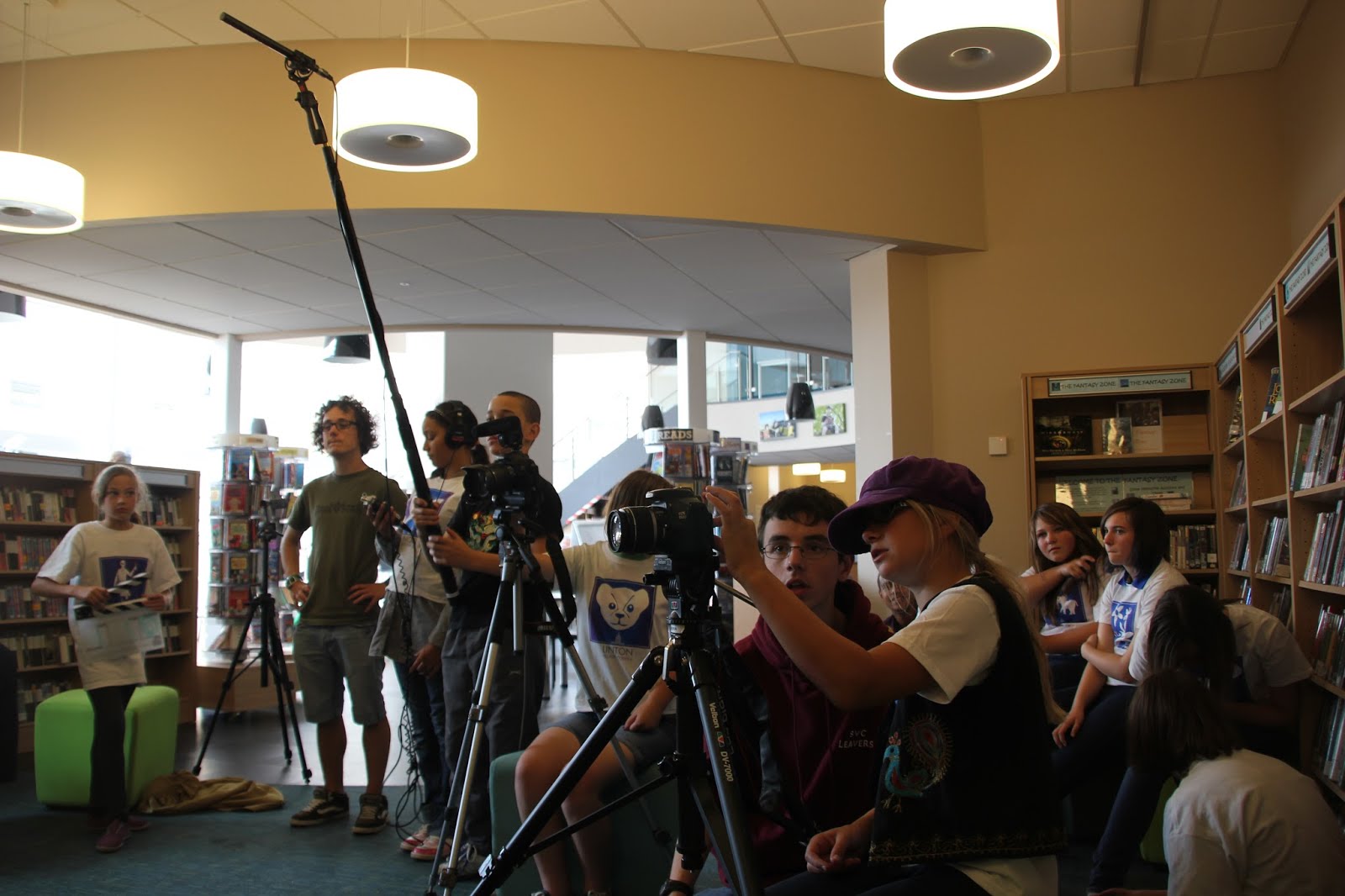
Filmmaking and Arts Award: peer learning
BY: Guest Writer
29 Aug 2023
Lesley Morgan, Arts Development Manager at Sawston Village College in Cambridgeshire speaks about the value of filmmaking and film screenings at their on-site cinema and how peer learning is supported as part of their Arts Award projects.
On-site cinema – how this came about
Sawston Village College was the brainchild of educator Henry Morris who pioneered the provision of education ‘from cradle to grave’ through his revolutionary village college movement. As Sawston Village College was the very first of his schools, and the success of his vision was still to be proved, Henry Morris was left to raise much of the funding for his ambitious project, which led to Sawston Village College being in the slightly unusual position of having a cinema building on its school site.
One of the people Henry Morris approached for support was Sawston businessman Harry Spicer. Spicer agreed to provide the land for this new school if, in exchange, he could access the school hall to put on film screenings for the community. Although Henry Morris initially agreed to this plan, he later changed his mind: he saw film as focused on entertainment, while he was in the business of education.
Harry Spicer later retaliated to Henry Morris reneging on their agreement by deciding to build a cinema right next door to the school.
Intergenerational heritage project
The cinema closed in the 1960s, and the building then became a youth centre run by the school and used by the community until, in 2007, the Cambridge Film Trust offered to support the school in returning screenings to the building. As this project got underway, an intergenerational heritage project was also started, to trace the history of the building and to capture people’s memories of attending screenings there. The result was a film, Projecting the Past, which was screened in the original cinema building and marked the start of Sawston Cinema, a school-run initiative.
Multi-purpose cinema
The reopening of the building for film and this exciting screening sparked a passion for film in the school that has remained ever since. Today, we have a thriving extracurricular ‘Cinema Club’ which meets in the building and is dedicated to filmmaking. In addition to this, we run regular screenings for the community and have pupil volunteers supporting these. We are also part of Into Film; hosting festival screenings, entering films for their awards and writing film reviews.
Arts Award – filmmaking and film screenings
As 2007 was the year that both the focus on film and Arts Award started in school, it seems natural that both activities have grown together. Our filmmaking and film screenings support young people to complete Arts Award at Bronze, Silver and Gold levels.
Bronze
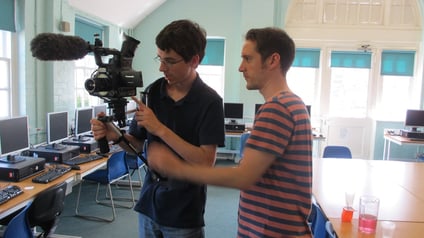 We have lots of young people use the film project they are involved in for their Bronze part A; exploring the arts as a participant. We have a professional filmmaker who supports our club activities, where pupils will learn about developing a film idea, writing a film script, storyboarding, auditioning for parts and all the different roles in film production; from being an actor in front of the camera to being the cinematographer, the boom operator or film director.
We have lots of young people use the film project they are involved in for their Bronze part A; exploring the arts as a participant. We have a professional filmmaker who supports our club activities, where pupils will learn about developing a film idea, writing a film script, storyboarding, auditioning for parts and all the different roles in film production; from being an actor in front of the camera to being the cinematographer, the boom operator or film director.
Pupils work collaboratively to make one main film per year per year group, before tackling their own projects in smaller groups. At the end of the summer term, we then have a red carpet film premiere where pupils dress up in their finery and present their films to family and friends, with pupil filmmakers taking questions from the audience about their films following each screening. These experiences lend themselves really well to completing part A of Bronze, with some pupils writing about the whole filmmaking experience, while others may focus on just one part of it, such as storyboarding. Some pupils are especially keen on film editing – cutting the main film, making a trailer, or pulling together a blooper film with all the outtakes - and, again, this works really well for Bronze part A.
It also works well for part D (arts skills share), where pupils might instruct a partner how to import film clips into a project, cut them and put them on a timeline (using Adobe Premiere Pro software). Meanwhile, our budding cinematographers might show a partner how to set up a camera on a tripod and basic camera functions like setting white balance for part D. Having regular community screenings in our cinema building also means our pupils have a steady supply of events for Part B, and film is a ready source of inspiration for Part C, with people like Steven Spielberg generally always featuring in work submitted for our Arts Award moderations.
Silver
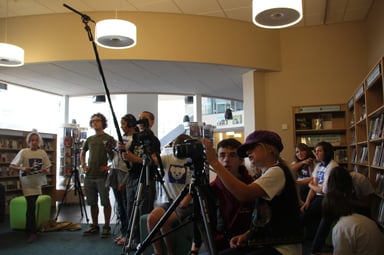 At Silver, pupils also use film projects for their Unit 1 challenge, generally focusing on their own projects for this and detailing every part of the film production process. We have also had pupils interested in music compose film soundtracks as part of a Silver Unit 1 challenge. For the Unit 2 leadership project at Silver, senior pupils often support younger pupils. We run both a junior and a senior filmmaking club. Senior pupils may typically help with main film projects, managing the group and logistics, or they may recruit and lead a group of pupils through their own film project. We had a notable example in our recent July moderation where a Year 9 pupil doing Silver supported Year 7 filmmakers with their film project, The Museum of Wonders. Here is an extract from the young person’s portfolio:
At Silver, pupils also use film projects for their Unit 1 challenge, generally focusing on their own projects for this and detailing every part of the film production process. We have also had pupils interested in music compose film soundtracks as part of a Silver Unit 1 challenge. For the Unit 2 leadership project at Silver, senior pupils often support younger pupils. We run both a junior and a senior filmmaking club. Senior pupils may typically help with main film projects, managing the group and logistics, or they may recruit and lead a group of pupils through their own film project. We had a notable example in our recent July moderation where a Year 9 pupil doing Silver supported Year 7 filmmakers with their film project, The Museum of Wonders. Here is an extract from the young person’s portfolio:
‘We began some run-throughs of the script to see how well the actors knew their lines. First we did a scripted run-through, then one completely from memory, with me prompting. I’m pleased to say that the majority of them had significantly improved in how much they knew their lines since Thursday.’
Gold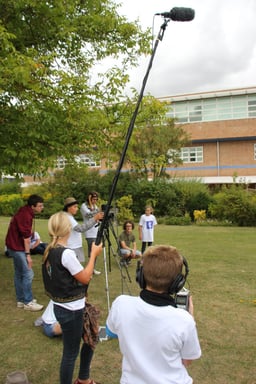
One of our previous students, a very dedicated filmmaker, completed his Gold Arts Award entirely focused on film. As part of this, he set up and led a younger pupil group to work on a film project which involved both live action and animation and then he oversaw and compered our annual film showcase event, where the film was premiered to much acclaim. You can see all the work he did towards his Gold Arts Award here. Following completion of Gold, while he was at university, he returned to school to lead an innovative summer holiday film project he had devised called Sculpting with Light.
Using film to promote Arts Award
As well as young people using film to complete Arts Award, we also use film in school to promote Arts Award. Each year we have all of our year 7s working to complete the Bronze award and we initially introduce each part in dedicated assemblies where we show a film featuring an older pupil talking about that particular part. You can see an example of this here.
Film presents a wonderful opportunity to support young people to achieve Arts Award. We have had many pupils go on to study film at sixth form and at university directly as a result of engaging with film and Arts Award, and so it is something we will continue to champion at Sawston Village College.
All photos by Sawston Village College
Related posts
BY: Annabel Thomas
BY: Alan Lynch


%2002.jpg)
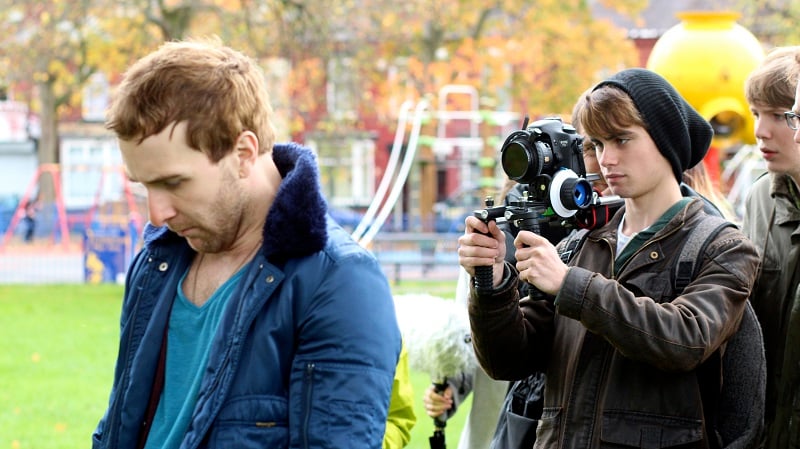
Comments & Replies